The Nayib Bukele Phenomenon

Pro-Israel and Muslim, Nayib Bukele is a new breed of Latin American strongman
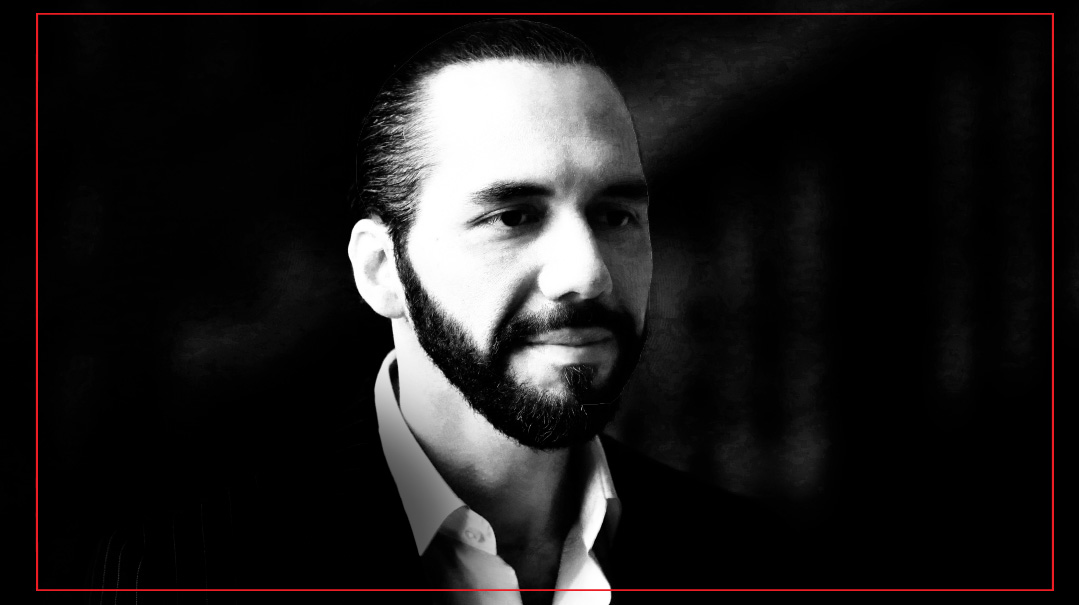
Photos: AP Images
Nayib Bukele, the brash young president of El Salvador, offers a study in intriguing contrasts.
He is descended from Palestinian Arabs, yet embraces a staunchly pro-Israel foreign policy. He entered politics under the banner of the Farabundo Martí National Liberation Front (FMLN), a Communist group that waged a guerilla war during the 1970s and ’80s; but now governs with a right-wing populist style that has drawn support from former US president Donald Trump.
Now 41, he was the world’s youngest head of state when he became president at 37, and, according to local opinion polls, is still the most popular. It almost seems a wonder that the tiny Republic of El Salvador — a country of 6.5 million, about the same size as New Jersey, on the isthmus of Central America, bordered by Guatemala and Honduras — can contain his gargantuan contradictions.
Nayib Bukele currently draws an approval rating of over 80 percent, and according to some pollsters, possibly as high as 90 percent. Feeding that popularity, however, is a harsh crackdown on the maras, the fearsome criminal gangs that have terrorized the country over the last two decades. While the influence of the gangs has been pernicious, contributing to a per capita murder rate that for a time was the world’s highest, Bukele has drawn criticism for the ruthlessness of his policies.
But Salvadorans seem not to be concerned about the president assuming extraordinary powers if that is what is necessary to guarantee “the pacification of the country.”
“The evaluation of Bukele’s government depends on how we define democracy,” José C. Moya, director of the Greater Caribbean Studies Program at Columbia University’s Institute of Latin American Studies, tells Mishpacha. “If we assess it as a liberal democracy, with its separation of powers, limits on executive power, and the rule of law, Bukele’s government is quite deficient. But if we define democracy literally as the sovereignty of the people, then the government of the world’s most popular head of state would necessarily be the most democratic.”
However popular Bukele’s fight against the maras has been, his economic decisions have not always proved successful. As part of his campaign to appear innovative and stay ahead of the curve, El Salvador adopted Bitcoin as legal tender nationwide and invested hundreds of millions of dollars of state funds in the cryptocurrency. The market fluctuations resulted in millions in losses for the country, although this has been overshadowed by the hype surrounding the war against the gangs.
“While he failed in economic terms by adopting Bitcoin as a legal tender, his crackdown on gangs (partly facilitated by secret negotiations with them) has made him a popular figure in his country, despite his gradual transition to authoritarianism and political repression,” explains Professor Arie Kacowicz of Hebrew University’s Department of International Relations to Mishpacha.
The development of Bukele’s ideology has not followed a traditional trajectory. He began his career in the FMLN, an ultra-leftist party, but has gradually shifted toward the center-right. Unlike other regional leaders who have been aligned with leftist movements, Bukele has been a staunch supporter of Israel. In fact, a photo of his visit to the Western Wall while he served as mayor of the capital of San Salvador has traveled the world. And although his ethnic background would suggest his sympathies lie with the Palestinians in their conflict with the Jewish state, that is not in fact the case.
“The fact that the current president is of Palestinian origin is neither an advantage nor a disadvantage for the relationship with Palestine,” PA emissary Marwan Jebril Burini said of Bukele in an interview with an Arab media outlet. “Our relationship is respectful.”
After Bukele’s election in 2019, Israel’s Foreign Ministry congratulated him and called him a “partner for cooperation,” noting that there were already friendly ties in place.
“We are looking forward to strengthening relations between the two countries, which has been characterized by friendship over the years,” a Foreign Ministry spokesperson said at the time.
Gustavo Sierra, a Latin American journalist known as an observer of the mara underworld, says Bukele’s persona represents a new trend for Latin American populist politicians.
“In this generation, developments have gone in the opposite direction of what happened in the past,” he says. “Politicians used to embrace a certain ideology, and sought supporters for it. Now they gauge the mood of the people and see what they want to hear, and based on that, they form their ideology. Bukele identified the main problem El Salvador faced and thought about what the people wanted to happen with it.”
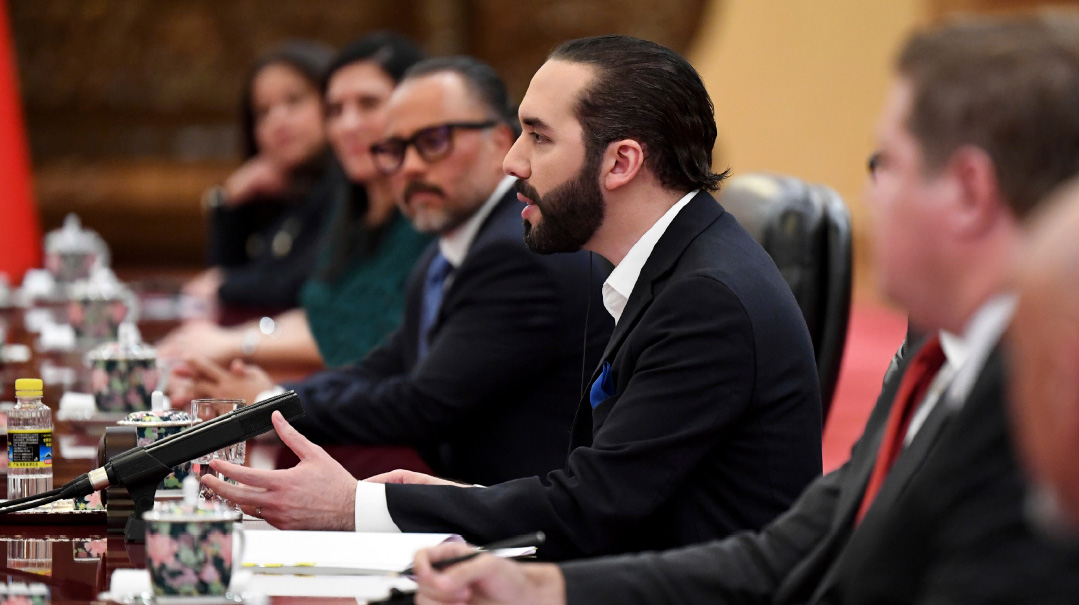
“THE WORLD’S COOLEST DICTATOR” El Salvador’s President Nayib Bukele has worked hard to build his brand, mastering both the microphone and social media
“Not a Grain of Rice”
The first image captures an unsettling scene: a sea of individuals with clean-shaven heads, clad only in white shorts, their bodies completely covered with intricate tattoos. They are seated on the ground in a posture of submission, hands resting upon their heads, under the watchful gaze of Salvadoran soldiers bearing rifles.
In the second image, these same individuals disembark from a bus, coerced into a sprint by surrounding police officers. Their destination: the state-of-the-art Center for Terrorism Confinement (CECOT), hailed as the “largest penitentiary in the Americas,” often simply referred to as “Bukele’s megaprison.”
With a staggering capacity of 40,000 inmates, this facility incarcerates the mareros, the members of the ruthless gangs that instilled fear in this nation for decades. Now, deprived of even the basic comforts of a mattress or sunlight, these prisoners endure severe hardships within the confines of this imposing structure.
In the third and final image, we encounter Nayib Bukele, the president of El Salvador, striding amid the rows of captives, flanked by two officers. His countenance resembles that of a lead actor in an action film, exuding a charismatic confidence. But this is not a movie trailer; it is part of an official promotional campaign orchestrated by this head of state, who seemingly operates in perpetual election mode, to cater to his millions of followers and devotees.
This type of governance draws vehement reproach from human rights organizations, who decry this treatment of prisoners as “inhumane.” But Bukele is undeterred. Sensing the populace’s hunger for a strong hand against the disorder that has reigned in El Salvador, he has disregarded the Legislative Assembly for over a year and orchestrated a sweeping overhaul of the Supreme Court.
If there’s one place where Nayib Bukele truly thrives, it’s behind a microphone. He understands that his audience extends far beyond the physical confines of an event, reaching his five million social media followers — just a million short of his nation’s entire population. Although he oftens dons a jaunty cap or leather jacket, Bukele showcased a more formal style at the United Nations, nattily attired in a suit.
Before addressing the assembly of world leaders, he surprised them by exclaiming, “Just a second, please!”
He seized the moment to snap a selfie on his phone, standing before the chamber. “Believe me, this selfie will reach far more eyes than my speech,” he declared, setting the tone for his address.
In a different televised speech, he directly addressed the heads of the criminal gangs whose rank-and-file were interned in CECOT. “I shall seize this opportunity to send a message to the criminals,” he confidently proclaimed. “Rumor has it that you seek retribution against those who play by the rules. Well, go ahead and try. But not a single morsel of food will make it to the prison cells! Let’s see how long your ‘home boys’ endure without a bite. I swear, they shall not taste even a grain of rice!
“And I don’t care about the opinions of international bodies! If you want to defend your gangsters, then come and claim them!”
The ensuing viral video stirred a mix of horror among human rights organizations, but as expected, it also garnered countless positive responses — not only from Salvadorans, but from throughout all of Latin America. The Bukele phenomenon has clearly struck a resounding chord in a region long plagued by organized crime.
“To comprehend the political and social reality within El Salvador, one must grapple with the phenomenon known as maras,” explains Gustavo Sierra. These gangs, he says, did not originate in Central America, but rather in the United States.
“Many young members of El Salvador’s FMLN, trained in guerrilla tactics and organizational methods, found themselves exiled to the United States, primarily Los Angeles,” he says. “There, in the most marginalized neighborhoods they inhabited, they encountered Mexican and African American gangs, which necessitated their self-defense.”
“This witch’s brew produced birthed the two most notorious mara factions: Mara Salvatrucha, or MS-13; and Barrio 18. “These gangs sowed terror wherever they went, committing various atrocities against both opponents and innocent people, and swiftly expanded throughout the United States, prompting the government to resort to deportation.”
Upon their return to El Salvador, the maras found the nation’s armed forces depleted, which created a fertile breeding ground for their resurgence. Their grip on the country soon made it impossible to conduct business or govern without striking deals with them. The governments preceding Bukele’s resorted to negotiations with the maras to maintain a semblance of order. Consequently, similar doubts have plagued the current leader.
“Undoubtedly, there might have been some sort of arrangement with the present government as well,” Sierra says. “It’s commonplace in cases like these, as we have witnessed in Mexico, to forge alliances with one gang while arresting the others. They serve as insiders, providing invaluable intelligence. Dismantling these colossal structures is extremely challenging without adopting such strategies.”
Whatever methods Bukele has employed, the statistics speak for themselves: In 2012, El Salvador boasted the highest homicide rate per capita worldwide, at 66 per 100,000 inhabitants. By 2015, that number skyrocketed to an unheard-of 103 per 100,000, more than triple that of Mexico. However, following Bukele’s ascension in 2019, the situation underwent a drastic transformation. The latest year-on-year data from 2022 reveals a significant drop to a mere 7.8 per 100,000 —a remarkable achievement by any measure.
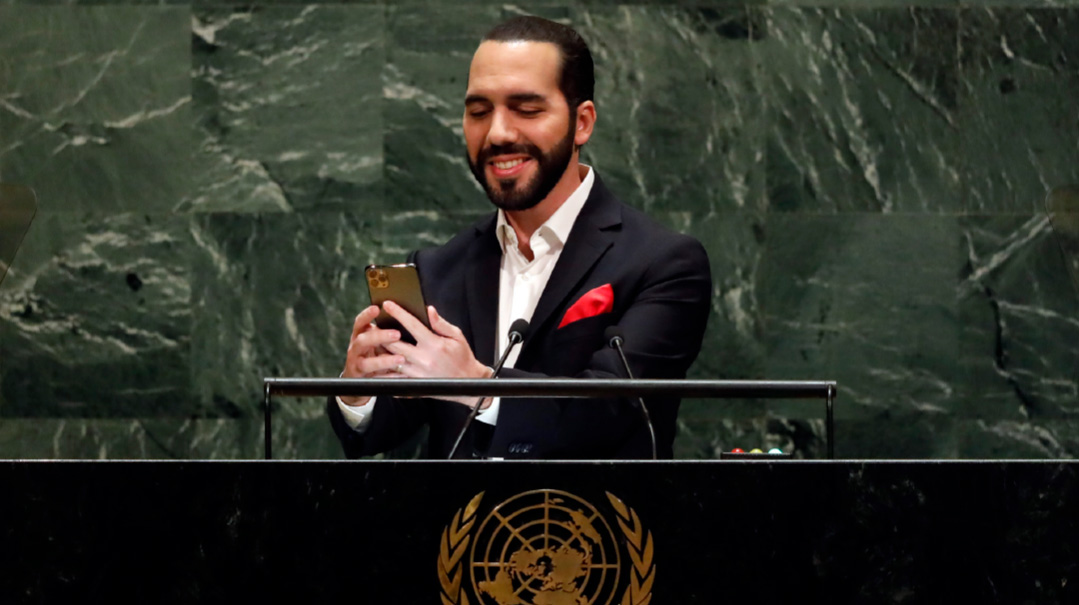
“JUST A SECOND, PLEASE” Bukele snapped a selfie as he began an address to the UN General Assembly
Boundless Ambition
Nayib Bukele’s improbable origins trace back to, of all places, Eretz Israel. His grandparents, Palestinian Christians hailing from Jerusalem and Bethlehem, were compelled to flee Muslim repression in the early twentieth century. They found refuge in El Salvador, where their son, Armando Bukele Kattán, made a name for himself in commerce.
Ironically, Armando would later embrace Islam, eventually becoming the leader of the Salvadoran Islamic community, marrying six wives, and fathering ten children, including Nayib.
Young Nayib grew up in a sheltered, upper-middle-class milieu, without any active interest in politics, although his nation was engulfed in the throes of a civil war. From 1979 to 1992, a right-wing government propped up by the United States attempted to wipe out the FMLN, supported by Cuba and the Soviet Union. The conflict claimed over 75,000 casualties, 8,000 missing persons, and hundreds of thousands seeking asylum, particularly in the United States.
Bukele acknowledges the privilege he grew up in; he once admitted, “I did not truly experience the ravages of war.” Nevertheless, his political destiny would draw him into the conflict. His father, Armando, sympathized with the leftist guerrilla movement, and after the war, when the FMLN transformed into a political entity, he assumed responsibility for party communications.
Nayib would later inherit the same mantle, cementing his official alliance with the FMLN. “I advised him against entering the labyrinthine world of politics,” confided Armando in a poignant television interview shortly before his demise. “Partisan politics devours time... and even within your own party, enemies lurk.”
But Nayib would soon develop a thirst for power that knew no bounds. At the tender age of 30, the FMLN’s upper echelons endorsed his candidacy for the mayoralty of Nuevo Cuscatlán. Winning that race by a razor-thin margin of less than 300 votes, Bukele was on his way. He gradually shed his ties to the FMLN while polishing his emerging “Bukele” brand.
During his mayoral tenure, Bukele employed classic populist measures, such as financial handouts and food distributions to families, leading to huge increases in public expenditures. But all the fiscal red ink did nothing to dim his popularity. In 2015, he set his sights on governing the capital, San Salvador. By this point the FMLN hierarchy viewed his meteoric rise with a mixture of apprehension and admiration, but they recognized him as the sole candidate capable of challenging their perennial right-wing rivals, ARENA. Bukele was 34 when he assumed office as San Salvador’s mayor under the FMLN banner.
Bukele’s boundless ambition brought him into contentious encounters with the FMLN, and he soon found himself ousted from the party. This led him to establish his own grouping: Nuevas Ideas (New Ideas). This strategic move allowed him to distance himself from the two parties that had driven El Salvador into poverty and turmoil, both of which had ruled in alternation since the end of the civil war. Bukele could now present himself as an outsider, a fresh face, captivating the attention of the younger generation. True to form, he declared his candidacy for president, boldly proclaiming, “The FMLN and ARENA tore our country asunder, turning brother against brother, with both factions fueled by foreign powers.”
And so in 2019, Bukele secured a resounding victory with 53% of the votes, ascending to the presidency in the first round. Perhaps sensing the challenges that lay ahead, he declared in his inauguration speech, “Our country is like an ailing child... Now, it is our collective burden to endure some suffering... to bear some pain... And yes, there will be tough times, there will be trying moments, but we shall confront them with unwavering courage.”
Within a few short months, he would confidently assert that he was “a divine instrument chosen to reshape the country’s history.” Yet despite these glimpses of what lay beneath the surface, none in attendance at that auspicious inauguration ceremony could have fathomed the unprecedented events that awaited them.
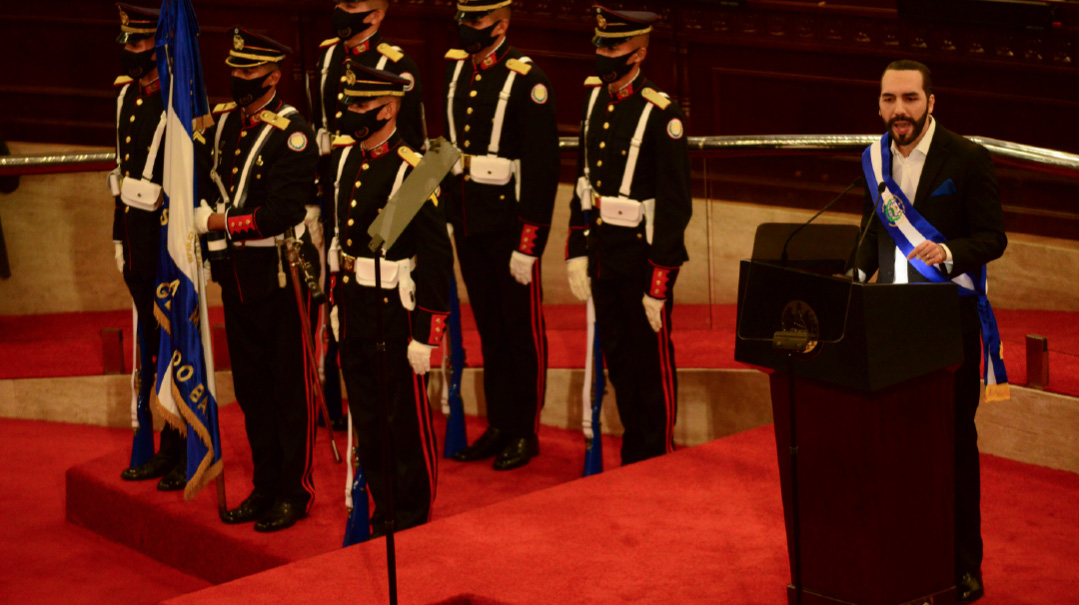
The Fracture
On March 25, 2022, an eruption of gang violence shook the streets, lasting three days and claiming a death toll of 87 — the bloodiest episode El Salvador has witnessed since the civil war. This brutality posed a direct challenge to the government’s promises of security.
In response, Nayib Bukele demanded that his allies in the legislature approve an “exceptional regime” to combat the gangs. The intended 30-day measure granted security forces unprecedented powers to apprehend individuals without charges, limit the right to legal counsel, and even prohibit gatherings of more than three people.
This measure has since been renewed 14 times, effectively subjecting El Salvador to an enduring “state of exception.” Facing mounting criticism, Bukele, asserted to the world, “El Salvador is a sovereign, independent nation, and we make our own decisions.” Furthermore, he said, “The human rights of law-abiding citizens hold greater significance than those of criminals.”
Within the framework of this “exceptional regime,” over 70,000 individuals have been detained without due process or just cause, and their families are deprived of contact. Meanwhile, numerous reports of arbitrary arrests, unrelated to the gang violence, have surfaced. Some contend that police officers face pressure to fill arbitrary arrest quotas, leading to the unjust detention of innocent civilians.
Mothers of the detained have fervently demanded information regarding their loved ones’ whereabouts, yet their pleas have yielded only evasive answers. In a candid interview with Mexican media outlet Gatopardo, Minister of Local Development María Chichilco — a former leftist guerrilla turned staunch Bukele supporter — acknowledged, “There may be innocent individuals among the detained, but the vast majority are not.”
The regime’s crowning achievement has been the rapid construction of the CECOT mega-penitentiary. This maximum-security facility is intended exclusively for mareros, condemning them to overcrowded conditions devoid of mattresses. Inmates are compelled to pay for their own sustenance, and are denied contact with their families or even outdoor respite.
While these measures have generated global shockwaves, Bukele has seized the momentum to modify the constitution to allow for his reelection.
Diego Hammerschlag, a professor of comparative constitutional law at Universidad de Palermo in Buenos Aires, says this move shows that Bukele is trying to entrench himself in power permanently while donning a cloak of legal legitimacy.
“In the specific case of El Salvador, the state of exception is legally sanctioned but lacks sufficient checks and balances,” Hammerschlag tells Mishpacha. “El Salvador’s Supreme Court of Justice is now packed with judges loyal to Bukele, following a highly controversial removal of its former members. Similarly, the legislative power, responsible for extending the state of exception every 30 days, is overwhelmingly composed of Bukele sympathizers. Co-opting other branches of government, including the nation’s highest court, is a key strategy in the authoritarian leader’s playbook. Ultimately, this renders Bukele a governor without any checks or balances, capable of claiming the extraordinary powers of a state of siege without any obstacles.”
Bukele has not only brushed off the mounting criticisms but has even gone so far as to ridicule them. For a time, his social media biography proudly proclaimed him as “the world’s coolest dictator.’”
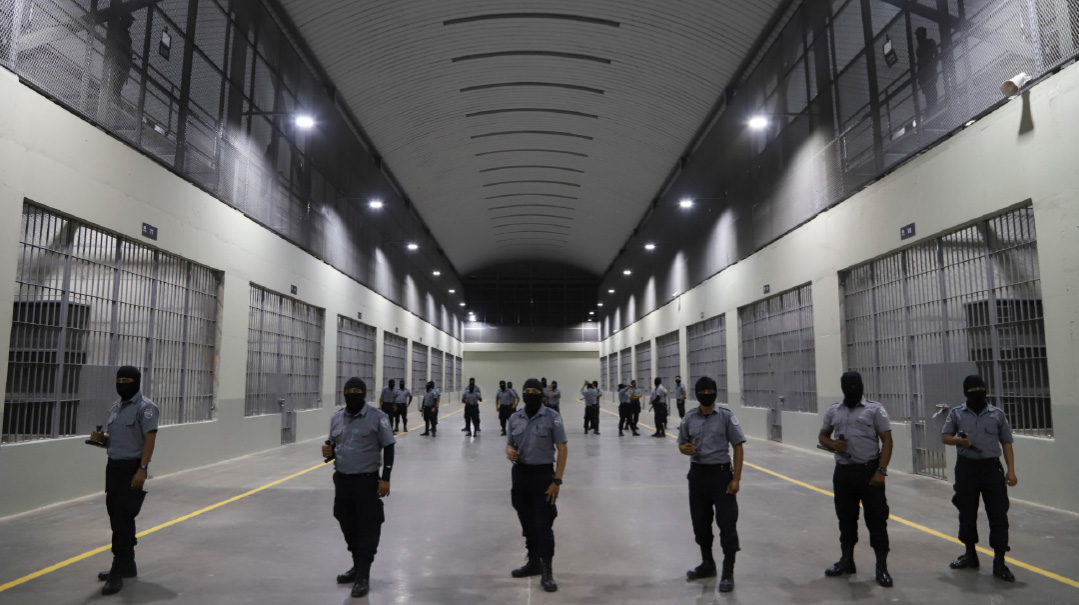
BUKELE’S MEGAPRISON With a capacity of 40,000 inmates, the CECOT penitentiary for gangsters has dramatically cut the murder rate — at a steep cost to human rights
Under the American Gaze
As the world condemns Nayib Bukele’s policy toward the maras, his strong stance has found a receptive audience in the United States, especially in the Republican Party and the conservative media. Commentators such as Tucker Carlson and Dinesh D’Souza have publicly applauded Bukele’s approach.
Senator Marco Rubio paid an official visit to El Salvador, and took to Twitter to express his frustration with Washington’s condemnation of Bukele’s policies: “Biden appeases our enemies & ostracizes our friends. Seeking deals with Iran & lifting sanctions on Cuba & Venezuela while criticizing & sanctioning willing partners like El Salvador under Nayib Bukele.”
Bukele has wasted no time reciprocating Republican accolades. Throughout his tenure, he has vocally criticized President Biden and shunned bilateral meetings, boldly asserting at one point, “The Biden administration is losing all the credibility it has left.”
Moreover, Bukele has made no secret of his affinity for former president Donald Trump. When Secretary of State Antony Blinken emphasized the US government’s support for El Salvador’s efforts to combat gang proliferation but urged the country to safeguard civil liberties, including freedom of the press, Bukele promptly fired back on Twitter: “Really? Yes, we received support from the U.S. government to fight crime, but that was UNDER THE TRUMP ADMINISTRATION. Now you’re merely backing the gangs and their so-called ‘civil liberties.’ ”
Bukele will likely continue to be a thorn in the side for Democrats, especially on the US domestic campaign issue of illegal immigration. Donald Trump consistently championed the fight against illegal immigration, wielding the maras as a wedge issue. Republicans continue to adhere to this stance, and Bukele’s track record has positioned him as a valuable campaign ally.
Bukele himself has outlined his goal to curtail the migration rate from El Salvador to the United States. “We don’t want to lose more people to the US,” he tweeted. “The best outcome for both parties (the US and El Salvador) is to retain our citizens here, providing for their needs in our homeland. That’s precisely what our people desire.”
And his government seems to be making good on that commitment. After years of consistently ranking among the top ten countries with migrants heading to the United States, El Salvador has now dropped much further down the list.
The Bukele phenomenon has gained so many followers worldwide that imitators have started to emerge elsewhere in Latin America. In Argentina, Honduras, Paraguay, Peru, and Colombia, demand has been growing for a local “Bukele.”
And apparently, Salvadorans will have to come to terms with the fact that the president plans to stay in power for a long time. With overwhelming approval and insistence that “there is much left to do,” Bukele reformed El Salvador’s constitution to allow him to seek reelection in 2024.
As a sign of the opposition’s desperation and the surreal political situation, the right-wing ARENA and the left-wing FMLN, who were bitter foes in the country’s bloody civil war, have announced that they will present a unified ticket to challenge Bukele. The president, undeterred, replied via Twitter, “The opposition is making it too easy for us...”
Nayib Bukele may provoke disparate reactions among observers, with critics sometimes decrying his policies and other times finding him in alignment with their own ideologies. With upcoming elections looming, one thing remains certain: The Bukele enigma will continue to drive the narrative of El Salvador’s future.
(Originally featured in Mishpacha, Issue 964)
Oops! We could not locate your form.







